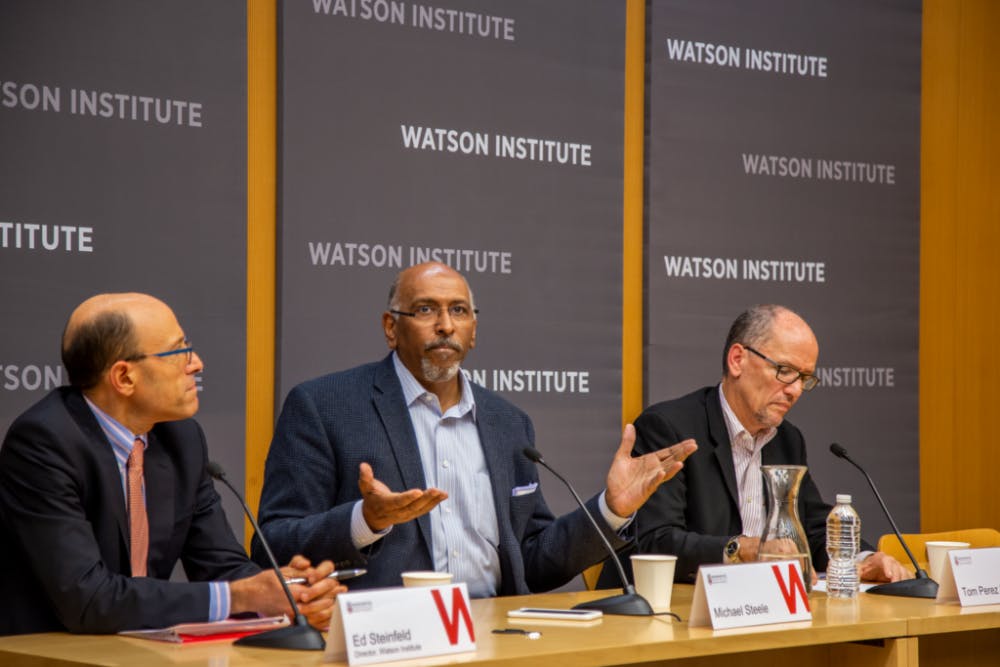Democratic National Committee Chair Tom Perez ’83 and former Republican National Committee Chair Michael Steele reviewed the aftermath of the 2018 midterm elections Nov. 19 at the Watson Institute for International and Public Affairs in the second and last forum of the series “Across the Aisle.” Following the results of the midterms, the duo examined voting trends in the United States, the demographic asymmetry of the two parties and issues that could become key in the 2020 elections. The event was moderated by Susan Moffitt, the director of the Taubman Center for American Politics and Policy.
Moffitt opened the discussion by applauding the turnout rates for the election. She asked both Perez and Steele whether voter turnout could be considered an upside to political partisanship: “Is this a signal of renewed political engagement?” Moffitt’s question set the stage for the two to focus their discussion on the role of voters in the midterms.
Steele congratulated his counterpart for his success in taking back the House of Representatives but remained focused on the task facing both parties in 2020. “We’re doubling down on crazy,” he said. Steele stressed that voters could not afford to disengage from politics just because the midterms are over. “That citizen responsibility has been amped up even more so going into the next two years.”
Before Perez could add to the conversation, a small group of student protesters stood up and urged the DNC to divest from fossil fuels before exiting the event. “I wish they had stayed” Perez remarked, emphasizing the need to approach the issue in an inclusive manner and adding that the shift to a green economy will be a slow and difficult process. However, in August, the DNC voted to reverse a ban on donations from fossil fuel interests, allowing contributions from “workers… their unions’ or employers’ political action committees.”
Perez went on to highlight the successes of the Democratic party earlier this month, particularly the work being done to engage voters. “There was very good message discipline,” he said. Perez praised the work of organizational groups who helped the DNC to help engage voters at the local level and noted the significance of winning state legislatures and statehouses across the country. “That’s a twelve-year election cycle because these governors are overseeing a redistricting cycle, and that’s a big deal.”
Moffitt then steered the discussion toward the record number of women elected to the House — according to CBS, over 100 women are projected to win seats in the House once all elections are called. She wondered whether the “Year of the Woman” would create change in the chamber. “We saw a lot of firsts. … Sometimes with these firsts, though, comes backlash,” she said.
Perez highlighted the growing diversity in the Democratic party. “I think our leadership in political America … ought to reflect who we are.”
Steele was cautiously optimistic, stating that it would be interesting to see whether new representatives could change the system from within without themselves becoming changed by it. “How do these women fit into … the established order?” In any case, newly elected female representatives, led by Rep. Nancy Pelosi (D-CA), have the opportunity to change the direction of the country. “If the women win, … watch out, because what comes after that … is an incredible change for the body politic.”
Perez added that “democracy cannot be a spectator sport, … and women have led the charge, and I applaud that.”
Moffitt brought up the recent ballot initiative passed in Florida that allows convicted felons to regain their right to vote and asked what other measures to increase voter turnout could mean for the parties.
Both Steele and Perez emphasized the importance of voter participation in the electoral process. Steele called for each state to re-evaluate its current rules surrounding voting, stating that many state processes are flawed and antiquated.
Perez brought up contemporary examples of state laws that have made it harder to vote, such as measures in Ohio, South Carolina and Florida. “We should make voting easier, not harder,” he added, echoing his statement from the last forum. Both men agreed that people should encourage state legislatures to re-evaluate their voting laws and take measures to protect the integrity of elections.

ADVERTISEMENT




